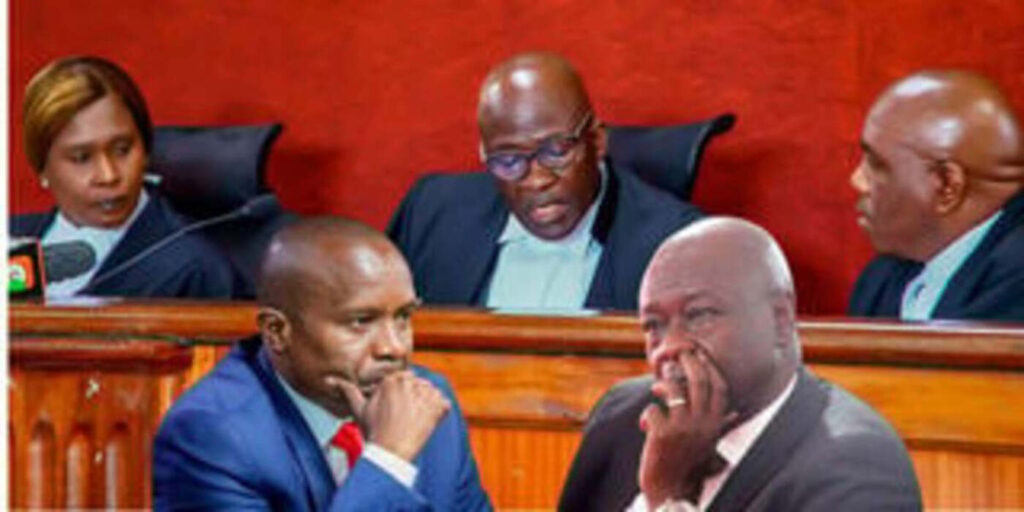Kenya’s political arena is bracing for a landmark ruling today as the High Court decides whether to uphold or lift orders blocking the swearing-in of Professor Kithure Kindiki as Deputy President. The ruling comes amid a fierce legal battle initiated by impeached Deputy President Rigathi Gachagua, who continues to contest his removal from office.

A Photo collage of Impeached Deputy President Rigathi Gachagua fighting for his fate as he faces his replacement Kithure Kindiki and the 3-judge bench ruling on Thursday. Courtesy photo
The legal dispute, which has captured national attention, stems from Gachagua’s impeachment by the two houses of the August House; the Senate and the National Assembly following allegations of misconduct and abuse of office. President William Ruto subsequently nominated Kindiki, a former Interior Cabinet Secretary and constitutional law scholar, as Gachagua’s replacement.
Constitutional Consideration
The case hinges on several constitutional provisions, primarily Article 150 of the Kenyan Constitution, which outlines the procedure for removing a Deputy President from office. Gachagua’s legal team, led by Senior Counsel Paul Muite, argues that the impeachment process violated Article 47, which guarantees fair administrative action.
“The rushed nature of the proceedings and lack of adequate public participation contravene Article 10 of the Constitution on national values and principles of governance,” senior Counsel Kioko Kilukumi argued before the court yesterday. He further cited Article 23, emphasizing his client’s right to fair hearing and due process
Political Implication
The three-judge bench, comprising Justices Eric Ogola, Anthony Mrima, and Freda Mugambi, must weigh the constitutional implications of their decision. Their ruling will determine whether the conservatory orders issued under Article 23(3), which currently prevent Kindiki’s swearing-in, should remain in force.
Professor Kindiki, a respected legal scholar and politician, has maintained a low profile throughout the proceedings. His nomination received overwhelming support from the National Assembly, with 280 members voting in his favour. However, Gachagua’s supporters argue that Article 148 on the vacancy in the office of Deputy President hasn’t been properly satisfied.
Legal Precedent
The case has drawn significant attention from constitutional experts, including Law Society of Kenya President Eric Theuri, who notes that the ruling could set a crucial precedent for future political transitions. “This case will define the parameters of impeachment proceedings and executive appointments in Kenya,” Theuri observed.
Political Landscape
Should the court rule in Gachagua’s favour, it would deal a significant blow to President Ruto’s administration and potentially trigger a constitutional crisis. Conversely, if the orders are lifted, Kindiki would be cleared to take office, marking a historic transition in Kenya’s political leadership.
The situation has also highlighted the delicate balance between Kenya’s three arms of government. Article 159 of the Constitution, which vests judicial authority in the courts, has been put to the test as the judiciary arbitrates this high-stakes political dispute.
Regional Implications
The case has drawn attention beyond Kenya’s borders, with regional observers watching closely. East African Community legal experts note that the outcome could influence similar constitutional matters across the region.
Public Reactions
The public remains divided, with supporters of both Gachagua and Kindiki holding demonstrations outside the court premises. Police, acting under Article 244 on the objects and functions of the National Police Service, have maintained heightened security around the Supreme Court building.
Way Forward
Today’s ruling is expected to address several key issues:
- The constitutionality of Gachagua’s impeachment process
- The validity of Kindiki’s nomination and approval
- The scope of presidential powers in appointing a deputy president
- The role of public participation in such processes
Both camps have pledged to respect the court’s decision, though legal experts anticipate possible appeals regardless of the outcome. The ruling is scheduled for today October 31st,2024.



















